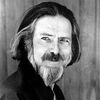As it is, we are merely bolting our lives—gulping down undigested experiences as fast as we can stuff them in—because awareness of our own existence is so superficial and so narrow that nothing seems to us more boring than simple being. If I ask you what you did, saw, heard, smelled, touched and tasted yesterday, I am likely to get nothing more than the thin, sketchy outline of the few things that you noticed, and of those only what you thought worth remembering. Is it surprising that an existence so experienced seems so empty and bare that its hunger for an infinite future is insatiable? But suppose you could answer, “It would take me forever to tell you, and I am much too interested in what’s happening now.” How is it possible that a being with such sensitive jewels as the eyes, such enchanted musical instruments as the ears, and such a fabulous arabesque of nerves as the brain can experience itself as anything less than a god? And, when you consider that this incalculably subtle organism is inseparable from the still more marvelous patterns of its environment—from the minutest electrical designs to the whole company of the galaxies—how is it conceivable that this incarnation of all eternity can be bored with being?
